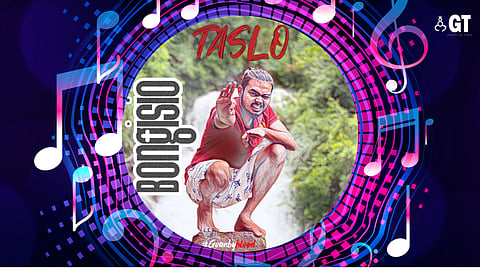

Fr Carlos Luis SAC
Moments after Carisio Azavedo aka Bongisio’s music video trailer “Taslo” dropped on November 5, 2022, it started to create a buzz on social media platforms. Coming from a family of musicians, the Merces-based Konkani rapper, singer, songwriter and music producer is known to represent social issues in his songs. Carisio was the winner of the best original song in the state for the Radio Mirchi Battle of the Bands in 2012. He began rapping in October 2020.
Carisio was a professor at Don Bosco Youth Welfare Centre, Parra, and was the executive producer of the studio at Don Bosco College, Panjim. He has a bachelor's in mass media and a master’s in social work, which he believes helps him in his music. He says, “I have a motto of letting my music carry out social work through the lens of my camera, wherein I use my mass media skills of direction and editing, and use my social work skills for the lyrics.” Carisio is also actively involved in youth empowerment through the sports club he runs.
For Carisio, his father is the first inspiration that allowed him to thrive in the world of music, as well as his late mother Bella Teles E Azavedo, whose vision he wants to hold on to till his last breath. But he says, “It was Russell James Vitale, an American rapper, who made me realise that one doesn't need fancy equipment to create good music...or a good laptop, software or record label. We are good to go the way we are, independently.”
He reasons that he chose to rap because, in hip-hop, rap is a form of expressing reality and not fantasy. It is through rapping that he could be the voice of the community and expose the wrongdoings of the politicians to the masses. He decided to rap in Konkani to take the language to an international level.
Speaking excitedly of “Taslo”, the music video which was released on November 9, 2022, he said, “So the beat I made for ‘Taslo’ was created a year ago. I was just messing around with stock plugins of the studio, and I wanted to do something with Indian classical instruments, so I infused a flavour of Indian classical melody and structured a beat which would relate to hip hop and gave it the zest of Konkani Rap.” The track speaks of the wrongdoings of fellow artists who fake hip hop to gain fame and do not allow others to grow. The song is brutally honest without taking names.
When it comes to rapping, the most interesting part is the lyrics of the song. Carisio says he finds it difficult to finalise the lyrics of his songs, considering they are brutally aggressive. He says, “I have to keep in mind that I have a young fan following, and it's too early for them to hear so much truth as cruel as it is, so I try to make it friendlier, and get the point across using my emotions in the lyrics and the depth of the beat.”
In an earlier interview, Carisio had said, “The main reason I decided to rap in Konkani was to save my mother language and tell everyone that hip hop can be done in any language.” He adds affirmatively, “I have seen a lot of youngsters who feel that Konkani is a lame language. They also feel it's not cool enough to speak in the language. But I feel we have a cool language and hip-hop will make it sound cooler.”
His songs like “Ketta” and “Fake” speak of the hypocrisy of politicians and human beings. He also speaks of issues like saving the Mollem forest, etc. He says that he wants people to notice that they need to voice their thoughts about the fake promises Goan politicians make. Hip hop, he trusts, gives a voice to the expression of one’s rights silently, and one can be a revolutionary in that sense.
Speaking of his next project, he states, “Aou Noko”. Well, that is the name of his next song. He explains, “The song is for all youngsters who fall in love at an early stage without sorting out their life and becoming responsible. It's just an honest take on what I have gone through as years passed and would not want my fellow fans and youth to go through.”
Carisio Azavedo is clear as to why he is here and how he is here. His hard work has made his rap go viral, and he says, “Keep trying harder even if it takes time and learn every day. One day for sure you will make it. If you are struggling to get stuff done, please ask for help, especially from your elders. If you do not ask, the answer will always be a ‘no’. But if one asks, it can be different.”
(Carlos Luis is a priest belonging to the Society of the Catholic
Apostolate (Pallottine) and is currently the mission secretary of the
ABVM Province, Bangalore. He comments on literature and films that
mirror life.)